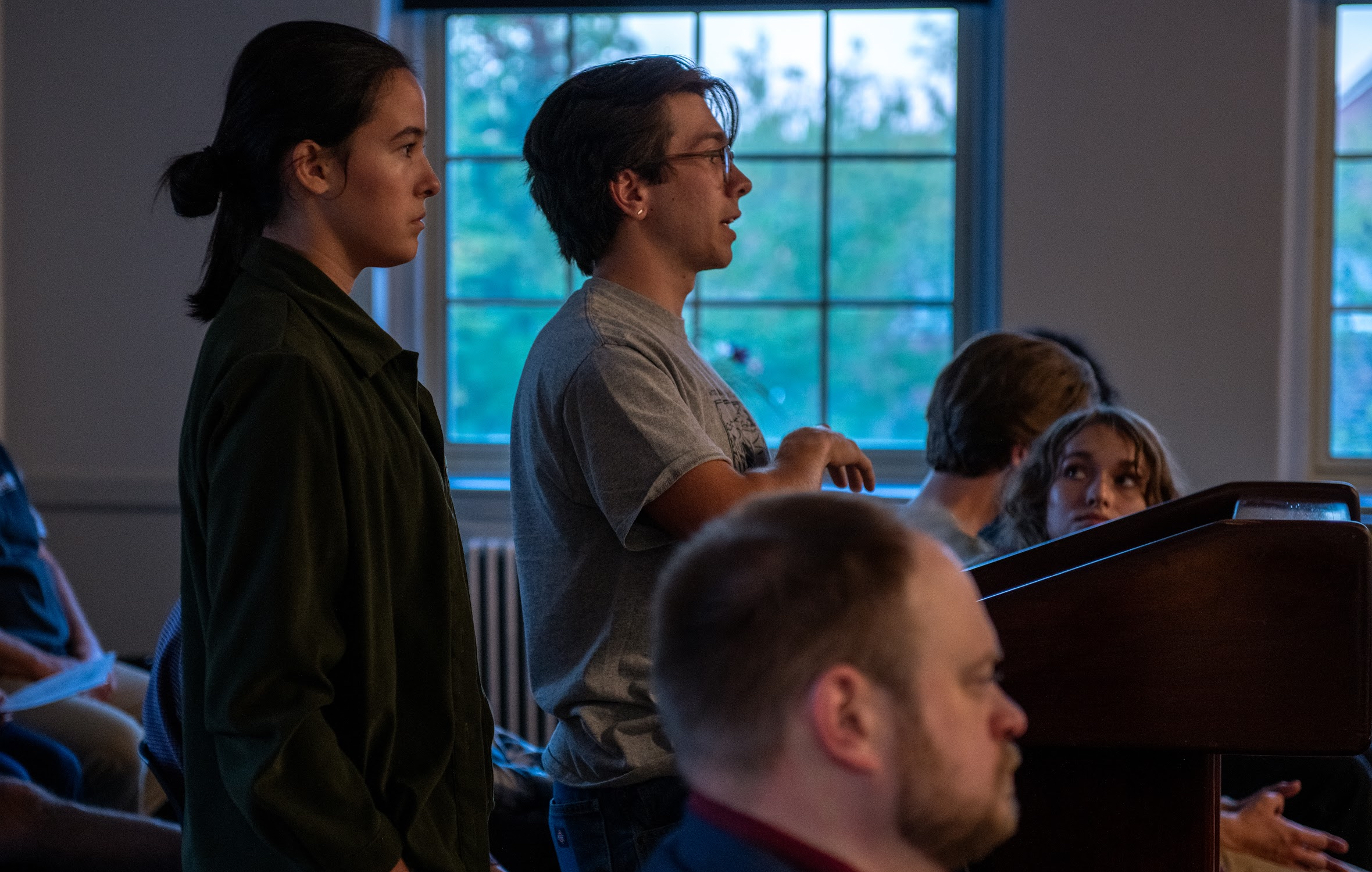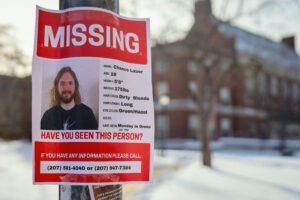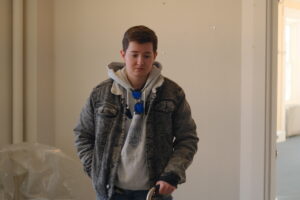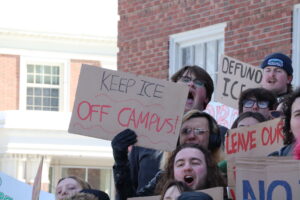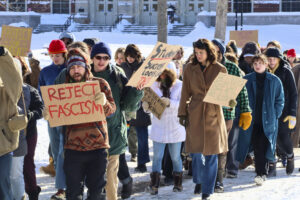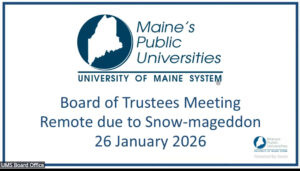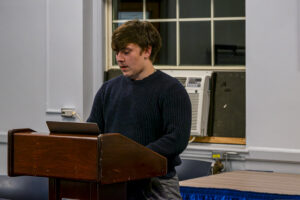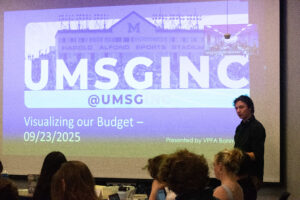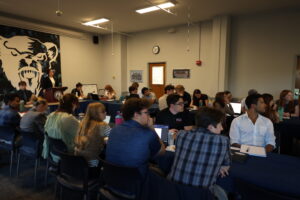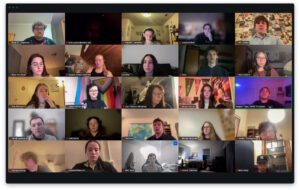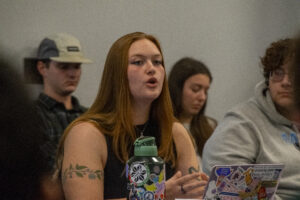The General Student Senate of the University of Maine Student Government, Inc. (UMSG) held its third meeting of the semester on Sept. 16, led by President Keegan Tripp and Vice President Cynthia Shelmerdine. At this meeting, Orono town administrators explained the motivations driving a recent town ordinance that will impose stricter regulations and steep fines on violations of town code by student-led house parties.
Appointments and Resignations
Senator Julianah Soper resigned her position. Four new members, Kai Whitehead (CLAS), Alayna Dana (CLAS), Marisa Shultz (At Large) and Christian Moro-Gordian (MBS), were sworn in as senators by Vice President Shelmerdine.
Club Maintenance
A host of new clubs and student organizations presented with the intention of securing preliminary recognitions for their groups. The History Club arrived with the intent of reforming after having disbanded as an organization the previous year. The Mushroom Club, which hopes to provide a space for students to interact with what they feel is the underappreciated field of mycology (the study of mushrooms), was also approved for preliminary recognition. Also asking for preliminary recognition was From the Den, a student media and broadcasting club aimed at giving communications and business students better professional opportunities in the journalism field, specifically with regards to sports broadcasting. The final seeker of preliminary recognition was the Society of Wood Science and Technology, which seeks to introduce students to experts in the field and allow them to use a wood shop for personal purposes.
Two groups sought final recognition. The Black Bear Esports Club, aiming to enhance Esports resources on campus, was swiftly approved and will now be an organization with full rights under the Senate. Finally, the Sustainability and Environment Action Division (SEAD) was recognized once more as a representative board after having disbanded several years ago due to disinterest. As a representative board, they will be required to have a liaison sitting in on meetings of the General Student Senate.
All bids were approved unanimously by the wider Senate.
Guest Speakers
This meeting featured several guest speakers, the first of whom was Sean O’Mara, the attorney and legal advisor for UMSG. After explaining his role as UMSG’s legal advisor, O’Mara engaged in a long discussion with students about the recently established Good Neighbor Committee in Orono. The committee is responsible for the recent Orono town ordinance that placed stringent new restrictions on nighttime gatherings, with stiff penalties for students who are found to have violated its provisions.
Orono Town Councilor Dan Demeritt was also invited to speak. Demeritt spoke on strengthening the relationship between UMSG and the town of Orono and said that he hoped to continually improve how new students were welcomed into the municipal community. He also reminded students of a recent change that had been propelled by various Orono-based activist organizations, moving town elections from March (when few students were present due to spring break festivities) to November, simultaneous with whatever local, state or federal elections were occurring at that time.
Town councilor Andrea Hardison, elected in 2024, strongly endorsed the idea of a Good Neighbor Committee to clamp down on rowdy student parties and stated that she hoped students could be a part of the process to find a solution to the tensions between longtime town residents and students. Newly-chosen Town Manager Clint Deschene, the final guest speaker, expressed similar sentiments and sought to justify the town’s harsh new enforcements on tenant issues. Both sought to reframe the new ordinance as a measure to resolve disagreements between renters and permanent residents, and not as the town targeting students.
Still, speakers faced questioning from senators disappointed with the passage of this ordinance over the summer and the general lack of students in the ordinance’s drafting process. Demeritt responded by noting repeated security incidents, including the vicious homophobic attack perpetrated against a homeowner in April and said that finding a solution to these incidents was an urgent matter while further noting that the Council had attempted student outreach when drafting the ordinance but received little interest. President Tripp, speaking on his own behalf, said that he felt positively about the town administration and student government working more closely on future matters where both are involved.
Executive Reports
For his executive report, President Tripp said that he hoped to make progress on forming the College Advisory Council, finalize a process for selecting the student trustee on the University of Maine System Board of Trustees (BoT) and more broadly improve student representation in administrative matters. Finally, Tripp said that he sought to finalize the syllabus bank project that has been ongoing for two years, empower the Student Entertainment Committee to spend its recent budget increases most effectively and make access to campus facilities cheaper for student groups.
Vice President of Financial Affairs Joshua Bohm reported that the remaining unallocated budget stood at $423,969.87. With regards to his goals, Bohm said that he hoped to more prominently utilize graphs and other forms of visual data to help senators understand ongoing spending and financial goals. He also wanted to begin measuring student reception towards events being funded by UMSG, so that they can receive a better value towards their yearly Communications Fee. Finally, Bohm wants to help host a sort of student organization showcase, where clubs could explain their purpose to potentially interested students.
Vice President of Student Entertainment Dillon Leeman hopes that more students will attend his Student Entertainment Committee, held in the UMSG chambers in the Wade Center from 2 to 3 p.m. on Tuesdays, as he believes that an infusion of new voices could help them expand their purview beyond their current concert and free movie ticket programs.
Committee and Representative Reports
BoT representative Olivia Britton reported on the most recent BoT meeting, which was held in Orono on Monday, Sept. 15. One speaker spoke out on behalf of University Park residents, who recently received notice that some of their parking spots would be converted into parking for on-campus students indefinitely. Twelve students attended the meeting and argued that the BoT must seek to divest from Israel, which has been credibly accused by numerous international organizations of having committed genocide in the Gaza Strip. They received renewed pushback from members of the board, who believe that the situation “on the ground” in Gaza has not changed since last November, when their last answer in opposition was delivered.
Moreover, Britton stated that an artificial intelligence task force commissioned by the university system made its recommendation that UMS ought to purchase the Google Gemini service for use by students and faculty members throughout the system. They also seek to raise the student technology fee in order to do so and do not intend to allow students to opt out of these programs. Britton noted that students are likely to have disputes with this implementation process and said that she has begun to look into ways students can voice their concerns.
Director of Technology Israk Arafat shared some of his goals for the upcoming semester, two of those being to modernize the UMSG website and add an accomplishments page that highlights the organization’s ongoing work.
Senator Nomination and Election Process
Following last week’s nominations for every open position, two seats were left unfilled: Faculty Senate Representative and Sergeant-at-Arms. After another nomination process, wherein senators are nominated by their peers and are asked to give speeches outlining their goals and qualifications for the role, two members were chosen to fill these roles. The new Faculty Student Representative will be Briar Chapin, while the new Sergeant-at-Arms will be Grey Vanderwood.
